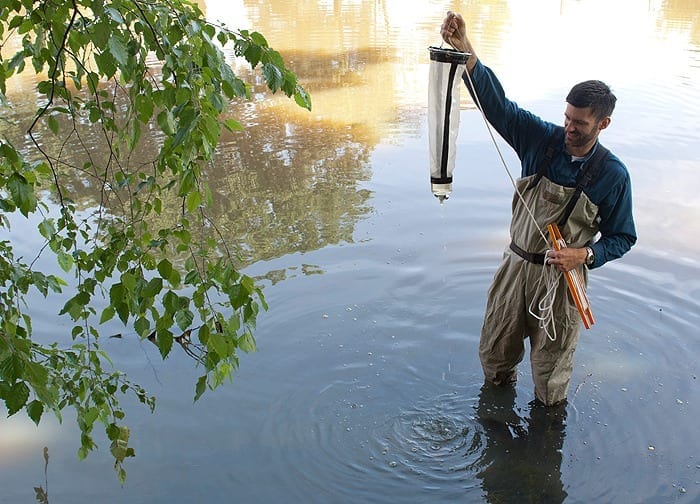
Scientists have discovered enhanced weathering of rock could counter man-made fossil fuel CO2 emissions and help to protect our oceans
An international team, led by researchers from the University of Sheffield, found that speeding up the naturally occurring process of the weathering of rock to draw CO2 out of the atmosphere could help to significantly stabilise the climate and avert ocean acidification caused by humans burning fossil fuels.
This is the first time the large-scale effects of weathering by vegetation, roots and symbiotic microbes have been investigated using a complex modelling approach to find out how to accelerate the Earth’s natural CO2 removal system to counter-act anthropogenic CO2 emissions and ocean acidification.
Weathering occurs when rainwater comes into contact with rocks under warm conditions causing the rock to breakdown chemically. This process converts CO2 to bicarbonate, a natural neutraliser, which eventually drains away via rivers to the oceans. Plants enhance this further by acidifying the soil particles around their roots. It helps if the surface of the rock particles is large such as in silicate rock like volcanic rock basalt.
Dr Lyla Taylor, from the University of Sheffield’s Department of Animal and Plant Sciences, said: “Phasing down fossil fuel emissions remains a top priority but we also need to better understand potential strategies for safely removing atmospheric CO2 to avert dangerous climate change.”
“We have shown that, in principle, rock weathering could indeed draw down atmospheric CO2 and could benefit coral reefs in the ocean.
“The simulations we ran were idealised as they covered some of the world’s most ecologically sensitive terrestrial environments, however our evidence shows that the enhanced weathering strategy is definitely worth investigating further as it could play a significant role in offsetting the damage we are doing to the environment.”
Ocean acidification is caused by the uptake of CO2 from the atmosphere which leads to an ongoing decrease in the pH of the Earth’s oceans and has a range of possible harmful consequences including coral bleaching which leaves the organism vulnerable to disease.
The United Nations estimates ocean acidification could cost the global economy one trillion US dollars a year by 2100.
Lead author of the study, Professor David Beerling, also from the Department of Animal and Plant Sciences, said: “This study is important because deploying strategies for removing CO2 from the atmosphere are strongly embedded in climate stabilisation policies but don’t yet exist.
“With the UN Climate Change Conference still at the forefront of everyone’s mind it is vital that we investigate the safety, effectiveness and benefits of methods such as enhanced weathering so we know what our options are. Detailed theoretical modelling like this is a good place to start.”
Read more: Enhanced rock weathering could help counter fossil-fuel emissions and protect our oceans
The Latest on: Enhanced rock weathering
[google_news title=”” keyword=”Enhanced rock weathering” num_posts=”10″ blurb_length=”0″ show_thumb=”left”]
via Google News
The Latest on: Enhanced rock weathering
- Verde AgriTech ranks in Top 100 Teams in XPRIZE Carbon Removal Competitionon April 29, 2024 at 6:23 am
As an official XPRIZE Carbon Removal Top 100 Team, Verde has been invited to participate in the Carbon Removal Capital Summit in San Francisco, September 10-12, 2024. This event will foster ...
- A New Use for Old Concrete Could Revolutionize Carbon Captureon April 25, 2024 at 6:30 am
Rock weathering is a natural process where minerals in the soil can capture carbon and sequester it as calcium carbonate in the oceans, but the process is an incredibly slow one. An Irish startup ...
- IDTechEx Release New Global Carbon Dioxide Removal Market Reporton April 24, 2024 at 11:50 pm
IDTechEx, a trusted provider of independent market intelligence, announces the availability of a new report, "Carbon Dioxide Removal ...
- BRIEFING: Additional MRV, policy support needed to scale enhanced weathering as a CDR solution, experts warnon April 23, 2024 at 4:18 pm
Advancing enhanced rock weathering (ERW) as a CO2 removal solution will require addressing MRV challenges and higher policy support, especially in Europe, members of a recently formed industry ...
- Leading the Charge Against Climate Change: World's Largest Green Olivine Mineral Reserve Cleansing Land, Air, and Wateron April 22, 2024 at 3:16 pm
Climate change casts a shadow over billions worldwide, as natural disasters, environmental degradation, and erratic weather patterns disrupt crops, deplete food sources, devastate fisheries, and ...
- CO2 removal brands will emerge, predicts McKinseyon April 19, 2024 at 8:19 am
The prospect of carbon dioxide (CO2) brands will emerge as markets become more regulated and decarbonisation accelerates, according to McKinsey.
- O2 Carbon Removed Event Pilot Extracts Over 540 Tonneson April 18, 2024 at 2:51 am
The O2 has announced the inspiring results from its pilot series of carbon removed arena events. Conducted across The 1975’s shows at the venue in February 2024, this world-first pilot saw the ...
- O2 removes 500+ tonnes of carbon during The 1975 gigson April 17, 2024 at 4:14 am
The pilot events have resulted in a blueprint for a more sustainable live event model utilising carbon removals ...
- O2 Arena removes 500+ tonnes of carbon in world first scheme during The 1975 residencyon April 17, 2024 at 12:26 am
The O2, the world’s most popular live entertainment, leisure, and retail destination, has today announced the inspiring results ...
- How The O2 Arena in London delivered the world’s first ‘carbon-removed’ concertson April 16, 2024 at 11:30 pm
EXCLUSIVE: The sustainability leaders involved in the delivery of the world’s first arena-scale concerts where all emissions generated were measured and removed outline the work that went on backstage ...
via Bing News











